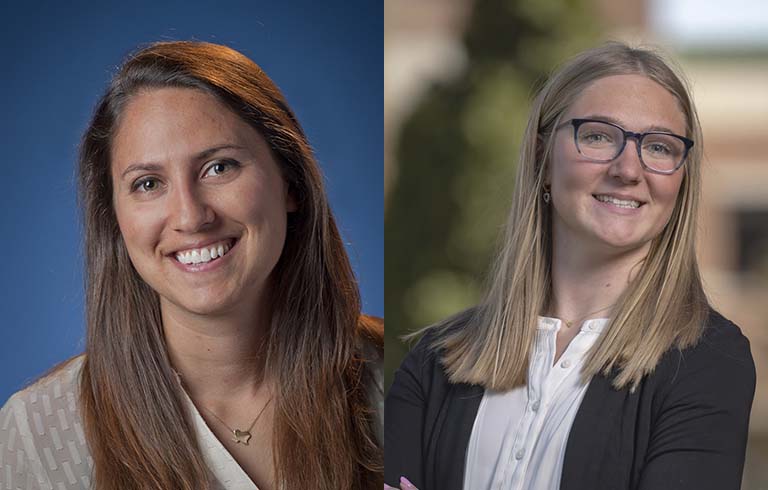
Two from Trine named to Forty Under 40
A Trine University administrator and a graduating senior are included in this year’s Greater Fort Wayne Business Weekly Forty Under 40.
April 11, 2024

COLUMBUS, Ohio — It was a day of firsts for students in Trine University’s McKetta Department of Chemical and Bioprocess Engineering.
On April 6, 16 chemical engineering majors traveled to Ohio State University to compete at the American Institute for Chemical Engineering (AIChE) Northcentral regional conference.
Trine students won the ChemE car and undergraduate research poster competitions for the first time.
Trine also placed second in ChemE Jeopardy, had another student place third for his undergraduate research poster, and placed third in undergraduate research technical presentations.
“We were one of the smallest chemical engineering programs competing — maybe even the smallest — and we were the only school to place in all competitions,” said Amanda Malefyt, Ph.D., professor in the McKetta Department of Chemical and Bioprocess Engineering and undergraduate research project advisor.
On target
In the ChemE car competition, teams design a car that starts and stops using a chemical reaction. The car that travels the closest to a designated distance, which is not revealed until the day of the competition, is declared the winner.
The Trine team of Natalie Crowner of Saline, Michigan, Madison Ruen of Antwerp, Ohio, Dean Campbell of Batesville, Indiana, and Travis Mersing of Swanton, Ohio, topped a field of 14 teams, including those from the University of Toledo, University of Michigan, Ohio State University, Purdue University and Rose-Hulman Institute of Technology.
The Trine car finished 4.4 centimeters from the target distance of 18.7 meters, qualifying the team for the national competition in October. The team also placed third in the poster competition related to the car.
“Safety is the foremost important aspect of the competition, so ensuring you are safe first then still being able to accomplish the task at hand can be difficult,” said Mersing, the team captain. “The car functioned precisely as designed, resulting in a final distance from the desired distance that not only the team was happy with, but was good enough to win the competition. It was also the closest Trine has ever come to the desired distance in a competition.”
Top research
Seven Trine students competed with undergraduate research posters, more than any other university.
Alyssa Keptner of Midland, Michigan, won with her poster, “Media Optimization for Biofuels from Cyclotella cryptica.” Her research examined the best methods for growing a unique cell type that is a promising candidate for biodiesel production.
“What excites me most about my project is the way it has developed over time,” she said. “Since I have been lucky enough to do it for a few years, there are so many new paths or side projects that I have been able to explore and see through, which is incredibly rewarding.”
She said the recognition confirmed her decision to attend Trine.
“Trine has allowed me opportunities like undergraduate research, where I get to control the direction of my project, and extracurriculars like lacrosse while also giving me a quality education,” she said.
Gavin Campbell of Leesburg, Ohio, received third place with his poster, “Antibody Panitumumab: Binding to HCT 116 Epidermal Growth Factor Receptor.” He continued research within the McKetta Department of Chemical and Bioprocess Engineering seeking to develop an antibody that inhibits colon cancer growth.
“There’s so much potential in pharmaceutical research. Antibodies and other therapeutics possess a wide variety of applications in medicine that can help a lot of people,” he said.
“A lot of what we do is on our own initiative,” he said. “It shows how hard we've worked over the past couple of years and how much we enjoy it. I'm proud of my ability to explain and spread interest for what I do. I overall had a great time presenting and competing.”
Annamarie Lechleidner Hartman of Bryan, Ohio, participated in the undergraduate technical presentation competition. Her presentation, “Mitigating the Effects of Road Salt on Concrete,” placed third.
“Participating in a research project really helped with developing improved time management in terms of planning an experimental process that takes multiple weeks from experiment start to finish,” she said. “Although it was nerve-wracking presenting in front of judges, the presentation itself helped fine-tune my presentation skills and reinforced my ability to develop a presentation under time constraints that showcases the most important results.”
2nd in Jeopardy
Trine sent three teams to compete in ChemE Jeopardy, with the team of Campbell, Zaavan Clear of Auburn, Indiana, Aaron Phillips of Marengo, Illinois, and Jacob Doyle of Marengo, Illinois, placing second out of 18 teams total.
Their team won both its preliminary and semifinal rounds to advance to the final competition against the University of Akron and the University of Wisconsin-Madison.
Akron won with 6,100 points, followed by Trine with 5,600 and UW-Madison with 0.
"We played well, taking chances when we had to in order to get a lead and playing conservatively with that lead to ensure we progressed to the finals,” said Doyle, the team captain. “While we weren't able to pull out the victory in the end, we still kept it to an extremely close competition, being in the running all the way until Final Jeopardy."
The team could possibly receive an at-large bid to national competition, depending on the outcome of other regional events.